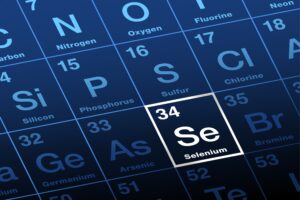
Selenium is a trace mineral found in soil, water, and certain foods, and it is necessary for the proper functioning of the body in small amounts. It is a component of selenoproteins, which are important antioxidant enzymes that protect cells from oxidative damage and support thyroid health. It is important in supporting a healthy metabolism, immune system, and cognitive function, and may also help reduce the risk of certain cancers.
Good food sources of selenium include Brazil nuts, seafood, lean meats, eggs, and whole grains. The amount of selenium in foods depends on the selenium content of the soil where the food was grown.
Most people in the U.S. consume adequate amounts of selenium from their diet with the recommended daily intake of 55 mcg for adults. The safe upper limit is 400 mcg (micrograms) per day.
Selenium is available as a dietary supplement, commonly in the form of selenomethionine or selenium-enriched yeast. However, supplements are not necessary if one is getting enough from food sources, in order to avoid selenium toxicity which is rare but can occur with excessive supplementation, causing nausea, hair loss, and nervous system problems.

Selenium supplementation has been found to significantly reduce insulin resistance and serum insulin levels in patients with cardiometabolic diseases. It has also been shown to increase high-density lipoprotein cholesterol (HDL-C) levels, which can have a beneficial impact on cardiovascular health.
For patients with kidney disease, selenium deficiency is common and can lead to complications like cardiovascular disease, bone loss, and anemia. Selenium supplementation may help address these issues, though more research is needed to fully understand its role.
Some studies have also suggested that selenium may have benefits in treating depression and sleep disorders. However, the evidence on this is more limited compared to the other areas discussed.
Furthermore, selenium has been shown to have therapeutic benefits against various cancers, including hematological malignancies. Supplementing chemotherapy and radiotherapy with selenium has been found to alleviate side effects and improve the quality of life in cancer patients. Selenium levels in patients have also been used as a diagnostic marker to track the efficiency of cancer treatments.
Genetics plays a significant role in influencing selenium (Se) levels in individuals. Genome-wide association studies (GWAS) have identified various single-nucleotide polymorphisms (SNPs) associated with blood selenium concentrations.
In a GWAS conducted on adult cohorts from Australia and the UK, significant associations between certain SNPs and selenium levels were observed. A locus on chromosome 5 was found to be significant in both cohorts, suggesting genetic variations affecting the metabolism of sulfur-containing amino acids and selenium compounds. This genetic locus spans several genes, such as the ARSB, DMGDH, and BHMT, and contains at least 10 SNPs that can have an effect on blood selenium levels.
Similarly, a GW meta-analysis of toenail selenium concentrations, reflecting prolonged exposure, identified a locus near DMGDH especially at the SNP rs248381, confirming the influence of genetic variation at this 5q14 locus on selenium levels. Furthermore, using genome-wide summary statistics from both toenail and blood selenium, statistical evidence of polygenic overlap was observed and meta-analysis of results from studies of either trait yielded a second significant locus at 21q22.3, harboring gene CBS and SNPs rs6586282, rs234709 and rs1789953.
GWAS have also elucidated the genetic basis of responses to selenium supplementation.
In a study involving participants of European descent, SNPs in the NEK6 and the above-mentioned DMGDH/BHMT regions were found to potentially influence changes in selenium concentrations after supplementation. Specifically, rs56856693, located upstream of NEK6, and SNPs in the DMGDH/BHMT region were nominally associated with changes in selenium concentrations following supplementation.
These findings underscore the intricate interplay between genetics and selenium metabolism. Genetic variations in genes related to sulfur-containing amino acid metabolism and homocysteine pathways influence selenium levels and responses to supplementation. Understanding these genetic factors can provide insights into individual differences in selenium status and may have implications for personalized nutrition and health interventions.
There are several key factors that can influence selenium levels aside from genetics:
There are two main ways to improve your selenium levels: through dietary changes and with supplements.
Unlocking your body’s unique genetic blueprint is a powerful tool in achieving optimal wellness. With the LifeDNA Vitamins and Supplements Report, you gain invaluable insights into your body’s specific needs, including crucial traits like selenium levels.
Understanding your selenium status can be pivotal, as this trace mineral plays a vital role in various bodily functions, from supporting a robust immune system to maintaining thyroid health.
Embrace the power of personalized nutrition and unlock the secrets hidden within your DNA to go on a path to enhanced vitality and well-being. Invest in your wellness today with the LifeDNA Vitamins and Supplements Report!
*Understanding your genetics can offer valuable insights into your well-being, but it is not deterministic. Your traits can be influenced by the complex interplay involving nature, lifestyle, family history, and others.
Our reports have not been evaluated by the Food and Drug Administration. The contents on our website and our reports are for informational purposes only, and are not intended to diagnose any medical condition, replace the advice of a healthcare professional, or provide any medical advice, diagnosis, or treatment. Consult with a healthcare professional before making any major lifestyle changes or if you have any other concerns about your results. The testimonials featured may have used more than one LifeDNA or LifeDNA vendors’ product or reports.


